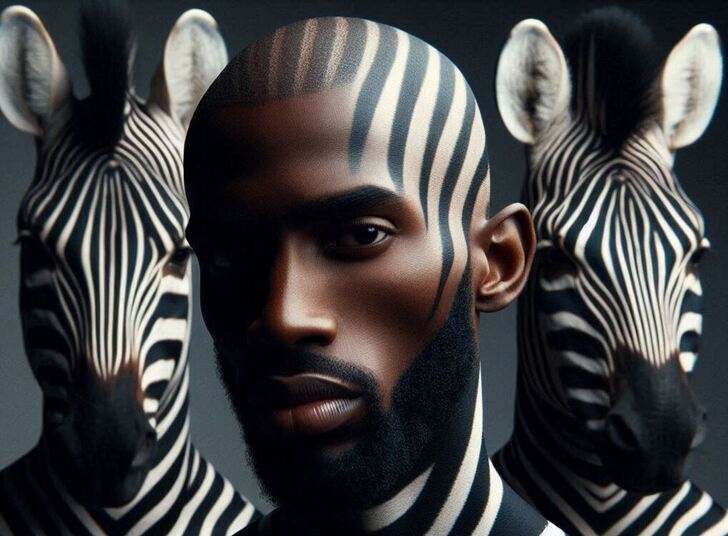Have you ever noticed how zebras, with their distinctive black and white stripes, manage to blend into a herd when they’re together? Even though each one looks striking on its own, when they move in a group, the stripes make it hard for predators to single out one zebra.
This behavior isn’t far off from how many people act in life. It’s human nature to want to blend in with the crowd, even when part of us might want to stand out. The Zebra Effect is all about this instinct to blend into the environment, and the impact that has, whether you choose to stand out or not.
Blending In Feels Safe
Most people want to be part of the herd, right? It feels safer when you’re not the one drawing too much attention. Blend in, avoid sticking your neck out, less trouble, smooth operator, and that’s exactly what they’re after. It’s easier to avoid criticism or judgment when you look, act, and behave like everyone else.
You can see this play out in a lot of situations. At work, people often stick to the dress code, avoid controversial topics, or stay quiet in meetings, not because they don’t have opinions, but because they don’t want to stand out. Social settings are similar. People avoid standing out in ways that might make them feel vulnerable.
- Wearing similar clothes to your coworkers, even though you’d rather dress differently.
- Keeping quiet about your weekend plans because they don’t match what everyone else is doing.
- Nodding along with a conversation even though you don’t agree, just to avoid rocking the boat.
For many, all this urge to fit in is driven by a desire for acceptance. They want to be part of something bigger, whether it’s a social group, workplace culture, or just society in general. It feels comfortable when you’re not the one out on a limb, and there’s a certain peace that comes with blending into the background.
The Consequences of Standing Out
Of course, the flip side of blending in is standing out, and that comes with its own set of consequences. Sometimes, standing out isn’t something you choose—it just happens. Maybe it’s how you look, speak, or think. When you stand out from the herd, it draws attention, and not all of it is positive.
Standing out can make you a target for criticism. Whether intentional or not, people tend to notice things that are different, and with that attention comes judgment. If you’re the only one wearing bright colors in a room full of neutral tones, people notice. If you’re the one with a different opinion, people notice. And once they notice, they often feel the need to comment.
- Wearing something that doesn’t fit the typical fashion trends in your social circle, and hearing someone make a remark about it.
- Voicing a different opinion in a meeting, and watching as people start to question why you’re thinking differently.
- Pursuing a hobby that’s less mainstream and having to constantly explain why you’re into it.
Standing out brings attention, and not everyone is comfortable with that. It means stepping out from the safety of the herd and becoming more visible. While that visibility can bring opportunities, it also brings judgment and sometimes even exclusion. People tend to be uncomfortable with what they don’t understand, and if you’re the one who’s different, you’ll often find yourself explaining or defending your choices.
The Pressure to Conform
Even though standing out has its perks, there’s a lot of pressure to conform. It’s in our nature to want to fit in with those around us. This pressure comes from all directions—workplaces, social circles, even family. People like predictability and comfort, and those who conform tend to find that they don’t have to deal with as much friction in their day-to-day lives.
This pressure is subtle, but it’s always there. From the way people dress, to the topics they discuss, there’s an unspoken understanding of what’s “acceptable” and what’s “different.” It’s easy to follow the crowd because that’s what’s expected, and stepping outside those lines can feel like going against the grain.
- Dressing down for an event because you don’t want to outshine anyone, even though you’d love to wear something more stylish.
- Pretending to like a movie or TV show everyone’s talking about just so you fit in with the conversation.
- Avoiding certain topics or hobbies that you love because they don’t align with the interests of your social circle.
This pressure to conform can make people hide parts of themselves. Over time, it can lead to a feeling of disconnection or dissatisfaction because you’re not being true to yourself. But the ease that comes from blending in often outweighs the discomfort of standing out, and that’s why so many people choose to conform, even when they don’t want to.
The Fear of Being Misunderstood
One reason people choose to blend in is the fear of being misunderstood. When you’re part of the herd, you don’t have to explain yourself. Everything you do is within the realm of what’s expected. But when you step outside those boundaries, suddenly people start asking questions...and that’s where things get tricky.
Being misunderstood is uncomfortable. You could say or do something with good intentions, but if it doesn’t fit the mold, it’s easy for others to misinterpret your actions. This fear can keep people from standing out because they don’t want to deal with the judgment or confusion that comes with being different.
- Sharing a personal interest, and watching people look at you like you’re strange for enjoying it.
- Expressing an opinion that goes against the norm, and suddenly finding yourself in the middle of a debate you didn’t want.
- Acting in a way that’s true to who you are, only for others to misread it as arrogance or attention-seeking.
Being misunderstood can make you feel isolated. It’s like speaking a language no one else understands. The more you stand out, the more you open yourself up to being misread, and that’s something most people try to avoid.
Finding Comfort in the Herd
For some, blending in isn’t just about avoiding attention or judgment; it’s about feeling connected to the people around them. There’s comfort in knowing that you’re part of a group that shares similar values, tastes, and ways of living. The Zebra Effect, in this sense, offers a sense of belonging.
Being part of the herd means that you don’t have to constantly defend or explain yourself. You’re part of a group where your actions, choices, and behaviors are understood without question. This kind of connection brings stability and comfort, which is why so many people are drawn to it.
- Going to a social event and knowing exactly what’s expected of you, from what to wear to how to act.
- Having conversations with people who share your interests, making it easier to feel connected and heard.
- Being part of a workplace or group where you fit in easily without having to constantly adjust who you are.
There’s a certain ease that comes with fitting into your environment. You don’t have to think twice about how you’re coming across because you’re in sync with those around you. This level of comfort is appealing, and it’s often why people choose to stay in the herd, even when they have the option to stand out.
The Costs of Blending In
While blending in has its perks, it also comes at a cost. When you’re always focused on fitting in, you lose a bit of yourself in the process. It’s easy to ignore your own preferences, desires, and quirks when you’re more concerned with what others think. Over time, this can lead to a feeling of disconnection from your true self.
Blending in too much can make life feel flat. Without the occasional risk of standing out, there’s less excitement, less room for growth, and less space for new experiences. While staying in the herd feels safe, it also limits your potential in ways you might not notice until later.
- Avoiding new opportunities because they don’t align with what everyone else is doing.
- Sticking with the same routine because it’s what everyone expects, even though you’re craving something different.
- Ignoring your own interests or desires because they don’t match the group’s vibe.
In the end, the choice between blending in and standing out is a personal one. There’s no right or wrong, just different consequences depending on the path you choose. But the Zebra Effect is real, and it shapes the way we move through life, whether we realize it or not. Sometimes, the desire to blend in is stronger than the desire to stand out, and that’s okay. But it’s also worth recognizing when the urge to fit in starts to come at the cost of who you really are.







